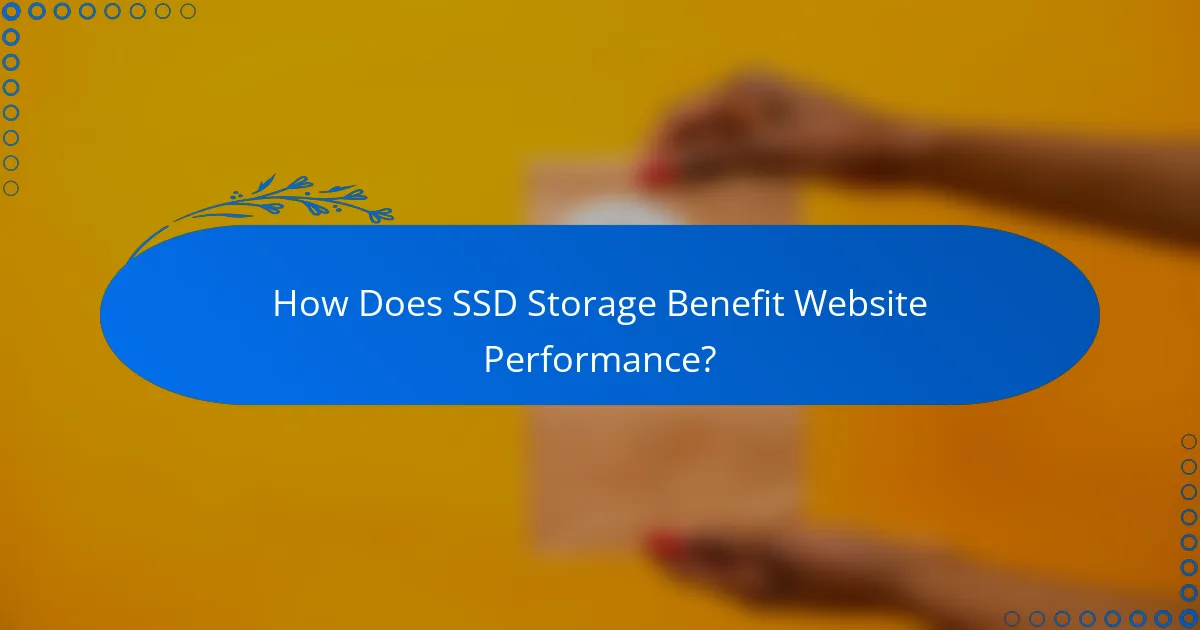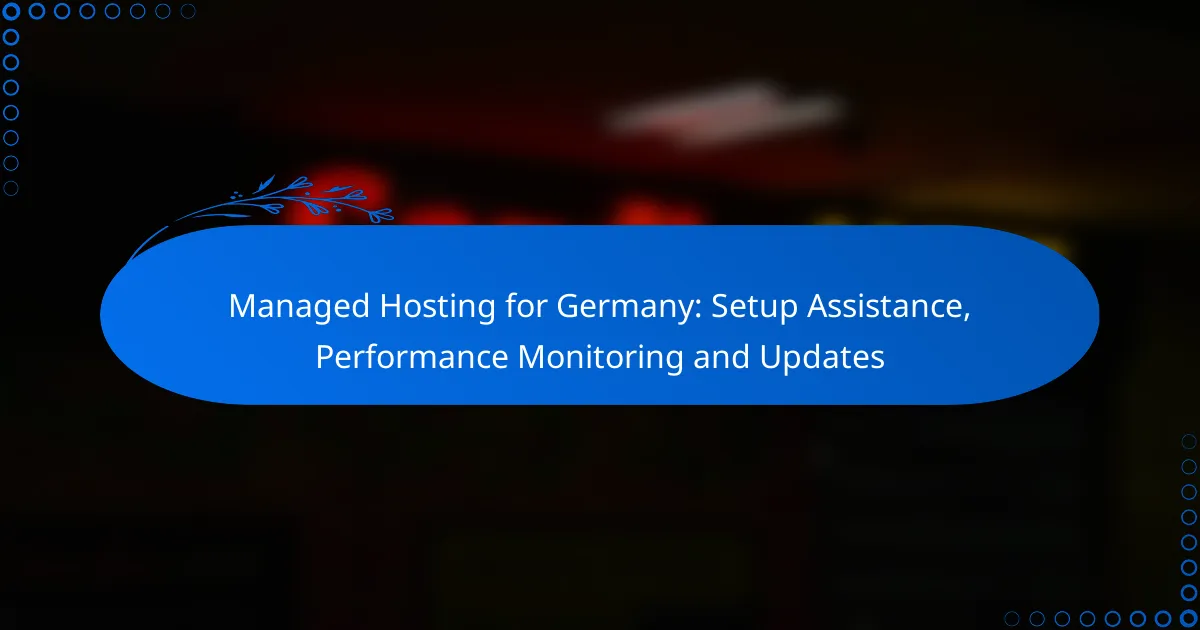Website hosting in Germany offers robust solutions featuring SSD storage, daily backups, and 24/7 support. These elements ensure enhanced performance, data security, and immediate assistance, making them ideal for businesses and individuals alike. Explore the top hosting providers that cater to diverse needs while prioritizing speed and reliability.

What Are the Best Website Hosting Options in Germany?
Germany boasts a range of reliable website hosting options, especially those with SSD storage, daily backups, and 24/7 support. These features enhance performance and security while ensuring optimal uptime, making them perfect for both businesses and individuals. Below are some of the top hosting providers in Germany, each offering unique advantages tailored to different user needs.
SiteGround SSD Hosting
SiteGround is celebrated for its high-performance SSD hosting solutions designed for diverse website requirements. Their SSD technology can cut loading times by up to 300% compared to traditional HDDs, significantly accelerating data access. Furthermore, SiteGround offers daily backups, safeguarding your data and ensuring recoverability, which is crucial for business continuity.
With a user-friendly interface and outstanding customer support, SiteGround simplifies website management. Their 24/7 support team is available via live chat, phone, and ticketing system, ready to assist with any issues. This level of support is essential for maintaining website functionality and security, particularly during peak traffic periods.
SiteGround provides a variety of hosting plans, from shared to dedicated, allowing users to select the best fit for their needs. Their commitment to performance and customer satisfaction, highlighted by a 99.99% uptime guarantee, makes them a top choice for reliable website hosting in Germany.
1&1 IONOS SSD Hosting
1&1 IONOS delivers robust SSD hosting solutions for both beginners and experienced webmasters. Their SSD storage boosts website speed and reliability, enhancing user experience and potentially improving search rankings by over 20%. With competitive pricing and flexible plans starting at just €1 per month, 1&1 IONOS is accessible for various budgets.
The platform includes daily backups, protecting your website from data loss due to unforeseen circumstances—a feature that can save businesses thousands in recovery costs. Their 24/7 support team is also on hand to resolve technical issues promptly, ensuring minimal disruption to your online operations.
1&1 IONOS offers additional features, such as a website builder and integrated marketing tools, making it a comprehensive solution for establishing or growing your online presence. Their focus on customer service and performance, backed by a 30-day money-back guarantee, solidifies their position in the German hosting market.
HostEurope SSD Hosting
HostEurope is a leading hosting provider in Germany, offering SSD hosting that guarantees fast and reliable website performance. Their SSD technology enables quicker data retrieval, improving loading times by up to 200%, which is vital for an engaging user experience. HostEurope also prioritizes security with daily backups included in their hosting packages, protecting against data loss.
Their customer support is available 24/7 through various channels, including phone and email. This support is crucial for users who may face issues outside regular business hours, ensuring help is always just a call away. HostEurope’s commitment to a 99.9% uptime guarantee makes them a trusted choice for many website owners.
Additionally, HostEurope provides a range of hosting options, including shared, VPS, and dedicated servers, allowing users to scale their solutions as their needs evolve. Their dedication to performance and customer satisfaction has earned them a strong reputation, particularly among small to medium-sized enterprises.
OVHcloud SSD Hosting
OVHcloud is a global hosting provider with a significant presence in Germany, offering SSD hosting that merges performance with affordability. Their SSD solutions deliver fast loading times and improved website responsiveness, enhancing user engagement and potentially boosting search engine rankings by up to 30%. OVHcloud also includes daily backups in their hosting plans, ensuring data integrity.
With 24/7 customer support, OVHcloud guarantees users access to help whenever needed. Their knowledgeable support team is ready to assist with technical inquiries, making website management easier. This level of support is essential for maintaining a seamless online experience, especially for e-commerce sites.
OVHcloud’s diverse range of hosting plans, including cloud and dedicated options, allows users to select the best fit for their specific requirements. Their commitment to innovation and customer service positions them as a leading choice for website hosting in Germany, appealing to tech-savvy users and startups alike.
All-Inkl SSD Hosting
All-Inkl is a well-established hosting provider in Germany, delivering SSD hosting that is both reliable and efficient. Their SSD technology boosts website performance, ensuring fast loading times and an improved user experience, which can lead to lower bounce rates and higher conversion rates. All-Inkl also prioritizes data security with daily backups included in their hosting packages, providing peace of mind for website owners.
The company offers 24/7 support, ensuring users can receive assistance at any time. Their customer service is known for being responsive and helpful, crucial for quickly resolving issues and minimizing downtime, especially for businesses reliant on their online presence.
All-Inkl provides a variety of hosting solutions, including shared and dedicated options, catering to a wide range of customer needs. Their focus on performance, security, and customer satisfaction, backed by a 30-day money-back guarantee, makes them a strong contender in the German hosting market, particularly for those seeking dependable service.

How Does SSD Storage Benefit Website Performance?
SSD storage dramatically boosts website performance, enabling faster data retrieval and enhanced reliability. Websites on SSDs can load in as little as 0.1 seconds, compared to 1-2 seconds for traditional HDDs—an essential factor for user satisfaction and retention. Google’s research shows that even a 0.5-second delay can cause a 20% drop in traffic, highlighting the critical role of speed in keeping visitors engaged.
For example, an e-commerce site utilizing SSD storage can load product pages in under 2 seconds, significantly lowering bounce rates. Studies reveal that sites with load times under 3 seconds can see conversion rates rise by up to 32%. This speed advantage translates into higher conversion rates, as users are more inclined to finalize purchases on fast-loading sites.
Additionally, search engines like Google prioritize faster websites, potentially boosting search rankings by up to 25%. Therefore, investing in SSD storage not only enhances user experience but also improves visibility in search results, making it a strategic move for businesses looking to strengthen their online presence.
Faster Load Times
One of the most notable benefits of SSD storage is faster load times. Unlike traditional hard drives, SSDs utilize flash memory, enabling rapid data access and transfer speeds that can reach up to 550 MB/s for reading and 520 MB/s for writing.
For instance, a website that typically takes 5 seconds to load on an HDD may only require 1-2 seconds on an SSD, resulting in a 60-80% improvement in loading efficiency. This significant reduction keeps visitors engaged and greatly decreases the chances of them leaving the site before it fully loads.
Moreover, research indicates that even a one-second delay in load time can lead to a 7% drop in conversions, potentially costing high-traffic sites thousands in lost revenue. Thus, faster load times are directly linked to increased sales and customer satisfaction, making SSDs a vital investment for any online business.
Improved Reliability
Improved reliability is another major advantage of SSD storage. With no moving parts, SSDs are less prone to mechanical failures, boasting failure rates as low as 0.5%, compared to 5-10% for traditional hard drives over five years.
This reliability ensures that websites hosted on SSDs experience less downtime, which is crucial for businesses that depend on their online presence. For example, a financial services website can maintain constant availability, allowing clients to access their accounts anytime without interruptions.
Furthermore, the durability of SSDs leads to lower maintenance costs over time, with businesses potentially saving up to 30% on repairs and replacements. This enables them to reallocate resources to other growth areas, enhancing overall operational efficiency.
Enhanced Data Access Speed
Enhanced data access speed is a defining feature of SSD technology. With superior read and write speeds, SSDs can manage multiple requests simultaneously without lag, achieving speeds up to 10 times faster than HDDs in some scenarios.
For example, a content-rich website that serves numerous images and videos can leverage SSDs to deliver content more efficiently, improving load times from 3 seconds to under 1 second during peak traffic. This capability is vital when many users access the site simultaneously, ensuring a seamless experience for all visitors.
Additionally, faster data access speeds can enhance the performance of dynamic websites reliant on databases, with quick data retrieval leading to smoother user interactions and a more enjoyable browsing experience. This efficiency is essential for retaining users and encouraging repeat visits, further solidifying the value of SSD technology in web hosting.

What Are the Advantages of Daily Backups?
Daily backups are a vital safety net for your data, ensuring quick and efficient restoration. This practice is crucial for businesses that depend on constant access to information; studies reveal that 60% of small companies facing data loss go out of business within six months. By implementing daily backups, organizations can significantly mitigate the risk of data loss, protecting their operational integrity.
For instance, if a server fails, a daily backup means the most recent version of your data is readily accessible, typically within a 24-hour window. This minimizes the impact of such incidents on business operations, allowing for a swift return to normalcy. The assurance of data recovery builds confidence among users and stakeholders, highlighting the importance of reliable data management.
Additionally, daily backups can be automated, seamlessly integrating into your existing workflow. Automation can reduce the need for manual intervention by up to 80%, significantly decreasing the potential for human error. Consequently, businesses can concentrate on their core activities while ensuring data integrity, a vital component for sustained growth and efficiency.
Data Recovery Assurance
The assurance of data recovery is a primary benefit of daily backups, providing peace of mind for users. In cases of data corruption or accidental deletion, having a recent backup allows for restoration without significant loss, with recovery times often measured in minutes rather than hours. This reliability is essential for maintaining business continuity, especially in industries where data accuracy is critical.
For example, if a critical file is mistakenly deleted, you can quickly retrieve it from the previous day’s backup, often restoring it within minutes. This process typically involves accessing your backup system, selecting the appropriate date, and restoring the necessary files, enhancing operational efficiency. The speed of recovery can significantly impact your ability to serve customers and meet deadlines.
Moreover, regular backups can be verified for integrity, ensuring that the data is not only recoverable but also accurate. This verification process checks backup files against the original data for consistency, preventing costly errors. By ensuring data integrity, businesses can trust their backups when they need them most, reinforcing the value of a robust data management strategy.
Minimized Downtime
Minimized downtime is another significant advantage of daily backups, enabling quick recovery from unexpected incidents. Studies indicate that 93% of companies experiencing significant data loss for more than 10 days file for bankruptcy within a year. When systems fail or data is compromised, having a recent backup allows for rapid restoration, reducing the time your business is offline and maintaining operational flow.
For instance, if a website goes down due to a cyberattack, restoring it from a daily backup can often be completed within minutes, allowing businesses to resume operations swiftly. This rapid response helps maintain customer trust and satisfaction, as users experience minimal disruption. The ability to quickly recover can also protect your brand’s reputation, making it essential in a competitive marketplace.
Additionally, minimizing downtime can lead to cost savings, with estimates suggesting that every minute of downtime can cost businesses between $5,600 and $9,000, particularly for e-commerce operations. By ensuring that backups are performed daily, companies can avoid the financial repercussions associated with prolonged outages, reinforcing the necessity of a proactive backup strategy.
Protection Against Data Loss
Protection against data loss is a fundamental reason for implementing daily backups. Data can be lost for various reasons, including hardware failures, software issues, or natural disasters, with 30% of businesses reporting data loss due to hardware failure alone. Regular backups act as a safeguard, ensuring that your information is not permanently lost and can be restored when needed.
For instance, if a hard drive fails, the data stored on it can be irretrievable without a backup, underscoring the importance of daily data preservation. Daily backups ensure that the most recent data is saved, allowing for recovery even in the worst-case scenarios, which is crucial for maintaining operational resilience. This proactive approach to data management is essential for safeguarding critical business information.
Moreover, daily backups can protect against malicious attacks, such as ransomware, which affected 37% of organizations in the past year. In such cases, having a backup enables businesses to restore their systems to a point before the attack occurred, often within hours. This capability not only mitigates the impact of the attack but also provides a clear recovery path, enhancing overall security posture and ensuring business continuity.

Why Is 24/7 Support Important for Hosting?
24/7 support is essential for hosting, ensuring immediate resolution of website issues and minimizing downtime. In today’s fast-paced digital landscape, where even a second of downtime can cost e-commerce sites up to $5,600 per minute, having round-the-clock support is crucial for a dependable online presence. This constant availability not only protects revenue but also bolsters brand reputation.
For example, if a website crashes at midnight, 24/7 support allows for a quick fix within minutes instead of waiting until business hours, which could take hours or even days. This swift response can significantly mitigate traffic loss, as studies reveal that 53% of mobile site visitors abandon a page that takes longer than three seconds to load.
Furthermore, businesses relying on e-commerce or online services gain immensely from continuous assistance, as it fosters customer trust and satisfaction, leading to retention rates as high as 90% when issues are resolved promptly.
Immediate Issue Resolution
Immediate issue resolution is crucial for any online business, as technical glitches can result in lost sales and dissatisfied customers. With 24/7 support teams trained for emergencies, businesses can address problems quickly—often within minutes. This rapid response is vital for maintaining operational continuity and customer trust; 70% of consumers prefer engaging with companies that offer 24/7 support.
For instance, if a server crashes, a support team can diagnose and fix the issue within minutes, rather than hours or days, which can severely impact operations. This quick action minimizes potential losses and reinforces customer confidence in the brand’s reliability.
Additionally, resolving issues promptly prevents minor problems from escalating into larger, costlier ones, with research showing that early intervention can save businesses up to 30% in potential repair costs. By addressing concerns swiftly, companies can conserve time and resources, leading to greater operational efficiency.
Expert Guidance Available
Having expert guidance available 24/7 allows businesses to access specialized knowledge whenever needed, particularly benefiting those with limited technical expertise. This access can significantly boost operational efficiency, as companies with dedicated support are 50% more likely to resolve issues on the first contact.
For example, if a business owner is unsure how to optimize their website’s performance, they can reach out for tailored advice on everything from server configuration to security measures. This expert insight can lead to a 20% improvement in website performance, directly enhancing user experience and satisfaction.
Moreover, expert support helps businesses stay abreast of the latest technologies and best practices, ensuring they remain competitive in the ever-changing digital landscape. By leveraging this knowledge, companies can adapt more swiftly to market shifts, positioning themselves ahead of their competitors.
Enhanced Customer Satisfaction
Enhanced customer satisfaction is a key benefit of 24/7 support, as customers value knowing help is available whenever needed, fostering trust and loyalty. Research indicates that 78% of consumers have abandoned a purchase due to poor customer service, underscoring the importance of accessible support.
For instance, if a customer faces an issue while making a purchase late at night, the ability to connect with a support representative can be crucial for completing the transaction. This level of service can lead to higher conversion rates, with studies showing that businesses offering 24/7 support can experience a 30% increase in sales.
Additionally, proactive communication from support teams can further elevate customer satisfaction. Regular updates about ongoing issues or maintenance reassure customers that their concerns are being addressed promptly, fostering a sense of reliability and commitment to service excellence.

What Criteria Should You Consider When Choosing a Host?
Choosing a web host requires careful evaluation of several critical criteria to ensure optimal performance and reliability. Key factors include performance metrics, storage options, security features, and customer support. Each element significantly enhances user experience and ensures seamless website functionality.
Performance metrics are crucial as they dictate how quickly your website loads and how well it manages traffic. Seek hosts that guarantee high uptime percentages, ideally above 99.9%, and server response times under 200 milliseconds. These metrics directly influence user satisfaction; studies reveal that a one-second delay in load time can result in a 7% drop in conversions, which can severely impact search engine rankings.
Storage options, especially SSD storage, are vital for speed and efficiency. Solid State Drives (SSDs) outperform traditional Hard Disk Drives (HDDs) by offering data retrieval speeds up to 100 times faster. Additionally, consider the scalability of storage as your website expands, ensuring your host can accommodate growing data needs without sacrificing performance.
Security features, such as SSL certificates and DDoS protection, are essential for protecting your website and user data. A host that prioritizes security can thwart potential breaches, with SSL encryption being a standard requirement for e-commerce sites to build trust with visitors. Finally, reliable customer support is indispensable; seek hosts that provide 24/7 assistance through multiple channels to address issues swiftly and minimize downtime.
Performance Metrics
Performance metrics are quantifiable measures that reflect how effectively a web host operates. These include uptime, load time, and server response time. High performance in these areas ensures your website remains accessible and responsive to users, which is critical for retaining visitors and boosting engagement.
For instance, a host with 99.9% uptime guarantees that your site will be down for no more than approximately 8.76 hours per year. Load time is another vital metric; ideally, your website should load in under three seconds to prevent losing up to 40% of visitors who abandon slow-loading pages. Server response time, ideally under 200 milliseconds, is also crucial for a seamless user experience, as delays can frustrate users and lead to increased bounce rates.
The consequences of poor performance metrics can be severe. Slow load times can result in higher bounce rates, with studies showing that a mere 0.1-second delay can decrease customer satisfaction by 16%. Frequent downtime can tarnish your brand’s reputation and lead to significant revenue loss. Therefore, choosing a host with strong performance metrics is essential for maintaining a successful online presence, especially in a competitive digital landscape.


